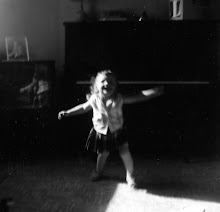In keeping with the all-over-the-map quality of this blog (to its detriment, probably, but, hey, it's my blog and I'll be electic if I want to), I'm probably going to post a few things on adult education since that's where my head is right now.
One of the courses I just finished here at the University of Calgary is called Adults as Learners. Another student and I gave a presentation on the theories of Carl Rogers, whose client-centered form of therapy grew into his theory of student-centered learning. Because he was one of the founders of the "encounter group," my partner and I dressed in Sixties gear (headbands, love beads, my first pair of flared pants since 1977) and played the opening strains of Jefferson Airplane's "White Rabbit" to introduce our topic. To illustrate Rogers's ideas, we tried to model his style of teaching by giving the class the choice to pursue a storytelling task any way they wanted to or to not pursue it at all, which led me to write this (partially edited) critical reflection paper:
I was struck by something a fellow student said during her presentation on Mezirow: she was surprised at how many of her colleagues had concluded that a research study they were conducting had gone wrong because the method and findings had not worked as predicted. “If our study had gone perfectly,” she insisted, “we would have learned nothing.”
This made me reflect on my own role as an adult learner and how much I learn from making mistakes. I admit I’m a perfectionist and I don’t like taking courses in anything I’m not already fairly good at. I suppose Adults as Learners has not been a huge stretch for me — not like learning to drive (I can’t) or swim (nope) or speak Mandarin (not a chance) would be. But still I had a lot to learn, and some of it came from being forced to do things I wasn’t good at and observing the gap between my performance and where I’d like to be.
[During our attempt to model a student-centered class on storytelling] I decided to provide the students with some suggestions (because I felt Rogers might have done that, based on what I read in his Freedom to Learn) for students who don’t like having the freedom to choose — they could tell stories to one another, either in pairs or in small groups, or they could write stories on their own, and I included the option to do nothing at all if anybody so wished. I am embarrassed to say it never occurred to me that the class would not be interested in any of my suggestions!...
But if my experiment with the task had gone perfectly, I wouldn’t have learned anything about what Rogers’ theory was really all about, or how it felt to practise it. I knew — or thought I knew — it was going to be unplanned but I hadn’t predicted how unplanned. It’s hard to prepare for the plan of no plan.
Earlier in my teaching career, I learned that making mistakes in order to learn has an impact on the maintenance of a safe learning space. When I was teaching at a community college, my students were 17 and 18, not very academically inclined and from very diverse backgrounds. One day a young man announced loudly to the class that he hated “queers.” My first instinct was to shut him down, but instead I asked him why. So he told the class how he had been hit on by gay men a lot, because, he thought, he was very boyish-looking. I commiserated with him on how uncomfortable it is to fend off unwanted advances. I hoped my comments would accomplish two things — I wanted to show the class that inappropriate sexual behaviour can be exhibited by people of every gender and sexual orientation; and I wanted to validate the young man’s experience.
But I was nervous as the discussion progressed: I was not going to let the subject pass without showing the students in no uncertain terms that I support gay rights; I felt strongly that my students should not be exposed to hatred or abusive speech in my classroom. Still, my support of free speech, particularly in an academic setting, is always stronger than my desire to be politically correct, mostly because I know that when we verbalize our opinions and find them hanging out there in the air for all to hear, that’s when learning occurs. People who keep their inchoate thoughts to themselves sometimes never change them because they’re never forced to fully form them. It’s in the expression of our thoughts that we are sometimes transformed, when we observe the gap between what we’ve just said and the evidence around us. I don’t usually even know what I think about something until I’m forced to put my thoughts into words, and often I don’t realize how ill-informed or silly or illogical my thoughts are until I hear them or read them (which is one reason I've edited this reflection before posting it on my blog). The learning doesn’t always happen immediately. Sometimes it takes days or weeks or years for me to respond to what I said.
On that day in my class, I clung to my desire to make my student feel safe enough to explore his opinions — even at the risk of creating an unsafe space for his classmates. I don't know if my students learned anything from that discussion, but I know I did. The boy's homophobia came from a place that was very real to him, a place that I could understand; we had more in common than I'd thought. (I confess I wasn't so supportive to the student who announced in class one day that "fags should be boiled in their own blood...")
Wednesday, July 26, 2006
Subscribe to:
Post Comments (Atom)








No comments:
Post a Comment